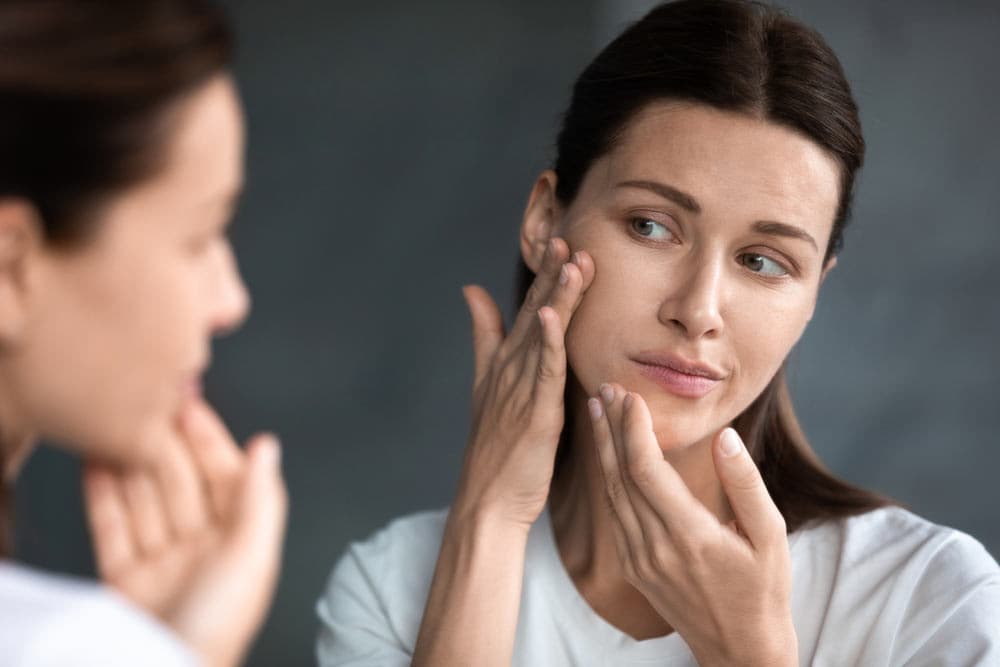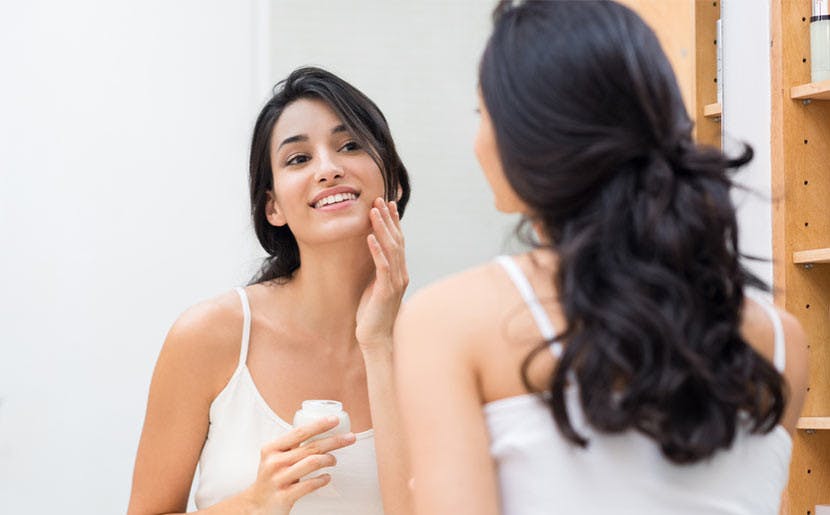What Causes Poor Skin?
Article by:
Amazing Discoveries™ |
8 min read
Skin problems don’t begin in the skin. They begin inside your body. Spots, blemishes, dullness, and wrinkles may be a sign that your lifestyle needs some changes.
Common skin concerns include wrinkles, acne or blemishes, and eczema. While acne is often considered more of a problem for younger people, adults can struggle with it as well. Although you might think a topical skincare routine is the best way to treat and care for problem skin, healthy, glowing skin starts on the inside. When you have a healthy body, you have beautiful skin.
What Causes Poor skin?
What is happening in the body that causes the skin cells to appear wrinkled, blemished or spotted?
Many factors, both internal and external, can influence the state of your skin.

Breaks in the Cell Walls
Skin cells that cannot hold water cause your skin to look damaged. When you provide your body with the right materials for making new cells, you will begin to produce skin cells with no breaks in the cell wall. Your skin cells will function optimally while appearing healthy and youthful looking.
Lack of Essential Nutrients
People usually accept poor skin as a part of aging, but your skin can look healthy at any age.
Leviticus 17:14 says, “For the life of all flesh is the blood thereof.” Science has shown that the body is able to convert skin cells into blood, when necessary. A study done at McMaster University found that it is possible to turn skin into blood without the skin cells first returning to the stem-cell state.
So, if you’re not giving your body the right materials to build with, the body will use skin cells to make the cells it needs. When your body uses skin cells as basic building materials for its other organs, your skin may look tight, discolored, or old as a result.
Poor Waste Management
Your skin is your largest organ1 and it plays an important role in your body’s excretory system. When your colon and other excretory organs are not doing a thorough job of removing waste from your body, your skin begins to do more of the waste removal work.
Acne, pimples, and blemishes result from waste passing through the skin’s pores. Unhealthy eating and poor elimination of the body’s waste cause the skin to look unhealthy and old.
Improper Diet
Eating poorly will have a negative effect on your body, resulting in less-than-perfect skin.
Studies have found a correlation between consumption of cow’s milk and increased expression of acne in young adults.2 A study of French adults found that a diet high in milk and sugar had a correlation with incidence of adult acne.3

Inadequate hydration can also negatively impact your skin. For healthy skin, it’s important to keep your body adequately hydrated.4
Existing Health Conditions
Health conditions such as diabetes can sometimes cause skin issues.5 Nearly 80% of people who have diabetes experience skin conditions such as infections and inflammation-related disorders.6
Stress
Stress can negatively impact your body, creating internal imbalance7 which manifests itself in the form of skin problems. Stress has the ability to elevate existing skin problems such as eczema or acne, or cause new ones to arise.8 Studies have found that skin is not only sensitive to perception of stress, but that the body targets the skin when stress is present. Stress can have a detrimental effect on the skin barrier’s function as well as the skin’s ability to repair damage or wounds.9
Intemperate Lifestyle
An intemperate lifestyle affects your body’s homeostasis and creates the right conditions for disease to set in. Eating animal products, foods high in sugar or damaged fats, consuming alcohol or drugs, and not drinking enough water will yield poor health. Maintaining a sedentary lifestyle, not dealing with stress, and spending too much time indoors away from the sun also contribute to an unbalanced life.
Consuming harmful substances by smoking cigarettes or marijuana is extremely detrimental to the health of your entire body, including your skin. On average, cigarettes contain 600 ingredients10 and can create over 7,000 chemicals when burned.11 Smoking increases your risk of chronic diseases such as cancer, decreases your circulation, increases levels of carbon monoxide in the blood, and elevates blood pressure.12 Smoking damages the skin, causing wrinkles13 and affecting the thickness of the skin.14
There’s Always Hope
The good news is, you can change your skin. Just because you have skin issues doesn’t mean you have to be stuck with poor skin for the rest of your life. It takes 30 to 45 days for new basal skin cells to move to the surface and become the cornified layer, which is the skin we see. A healthy diet and lifestyle, along with a healthy elimination system, are the beginnings of healthy-looking skin. Make changes to your lifestyle now, and you’ll notice the results in your skin after about a month.
When construction workers build a new house, they start at the basement, not the roof. If you want to have beautiful skin, you must start at the basal layer and provide your body with the right materials for building perfect new skin cells. Skin cells created under poor conditions have abrasions, discoloration, and age spots. You might think that age spots and blemishes occur because of damage that happens on the surface of the skin, but usually the trouble begins when the skin cells are being formed in the basal layer.

Changing your skin begins with changing your diet and lifestyle. If your skin needs improving, begin by improving what goes into your body and give it the best ingredients for making healthy skin cells. Following the 8 laws of health will help you maintain balance. When you take steps to improve your health, your whole body – including your skin – will benefit. Although it may take time to see good results, stick with it. Don’t get discouraged. It’s often hard to do the right thing, but with time and patience, you will start to look and feel better.
What You Need for Glowing Skin
Want to build better skin? Using the 8 laws of health as a guideline, here are some things you can do to support your body and get better skin.
Hydration
The skin is 64% water,15 and the body itself is about 60% water.16 Keeping adequately hydrated is important, especially if you are sick, work outdoors, or live in a hot place.
Proper nutrition
When you eat well, you give your body the support it needs to work properly, fight disease, and feel good. Fill your plate with fresh fruits and veggies, and try to include a plant-based protein source with each meal.
Sleep
Sleep is a time of regeneration in the body – this includes the skin. When you get enough sleep, your skin has time to repair itself and your body can maintain your skin better.17 Not only that, but when you’re well rested, your whole body is in a better state to resist disease. You feel and function better when you get the right amount of sleep each night.

Temperance
Stay away from harmful substances such as alcohol and cigarettes. Use moderation, even in good things. Living a balanced life helps your body maintain health.
Trust
Find healthy ways to deal with the stress in your life rather than letting it build up and overwhelm you. Worrying doesn’t solve our troubles (Matthew 6:27-34). When we allow God to take care of our problems, we can have peace.
There are many factors that contribute to healthy, beautiful skin. Good skin doesn’t start on the outside, but begins on the inside. When you care for your body, you give it the foundation it needs to build beautiful skin. By following the 8 laws of health, you can have healthy skin.
This article is adapted from Our External Thermometer, a lecture from Dr. Rudy Davis' series Healthy from the Inside Out.
These statements have not been evaluated by the Food and Drug Administration or Health Canada. Our articles, videos and products are not intended to diagnose, treat, cure, or prevent any disease. If you are pregnant, nursing, taking medication, or have a medical condition, consult your physician before following any recommendations or using any product on our site. You assume sole responsibility for your personal health, and you must use your own discretion under doctor consultation to determine whether any product or recommendation on this site is suitable for your personal situation.








